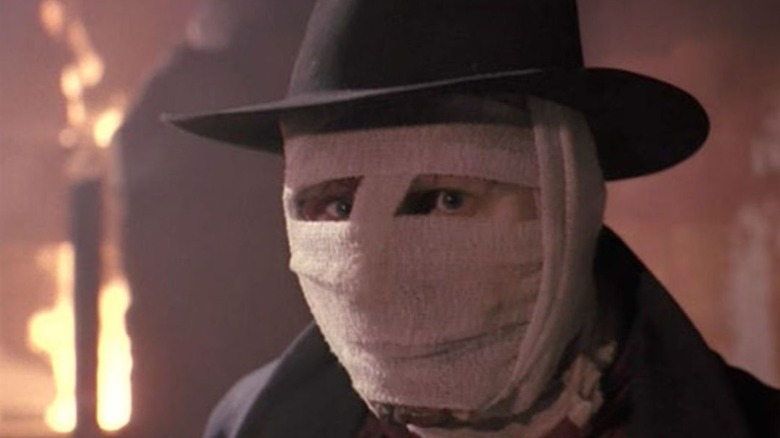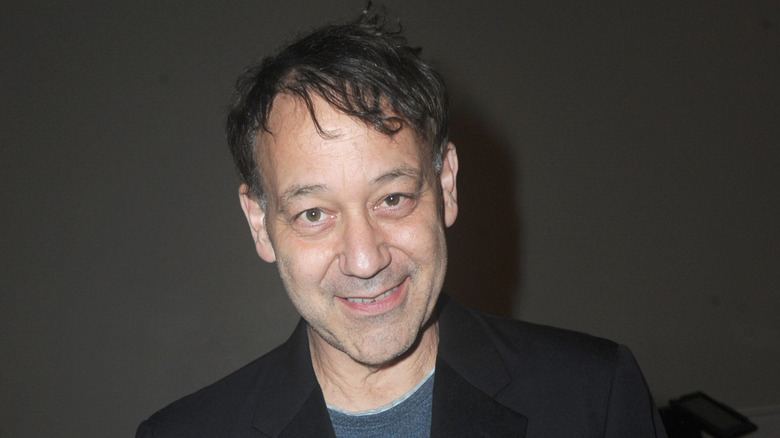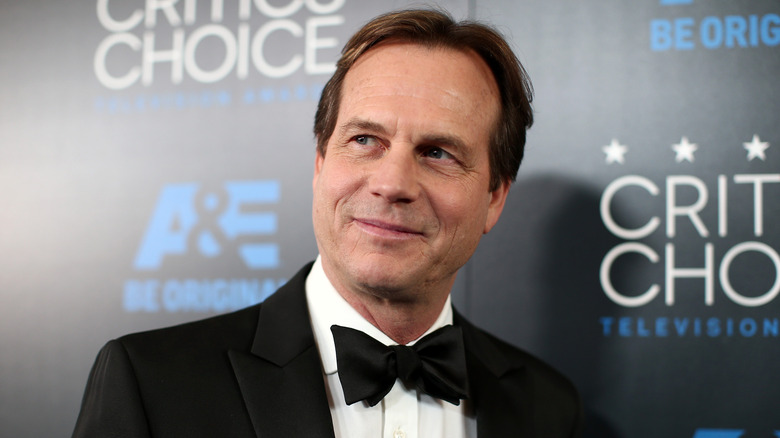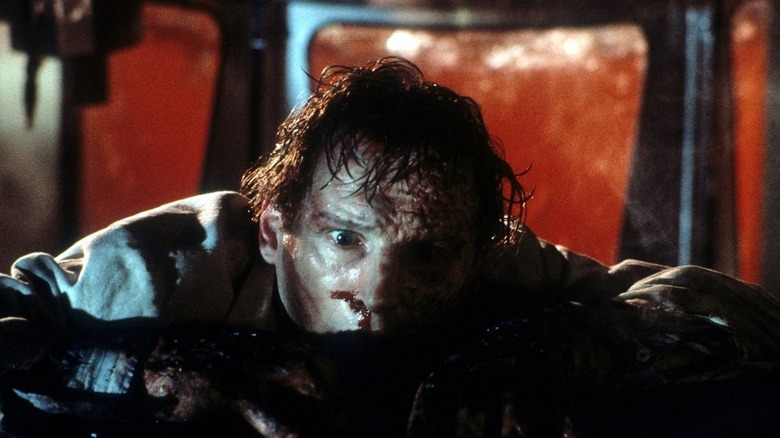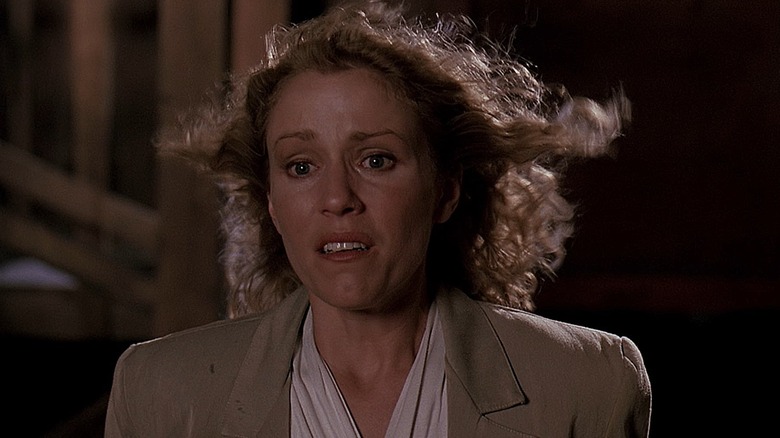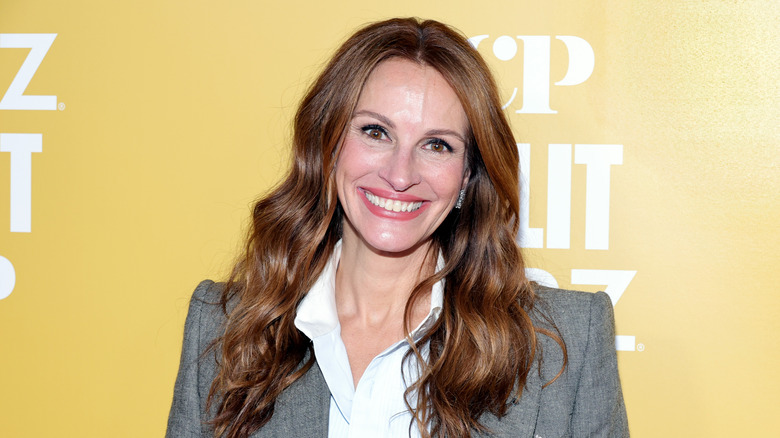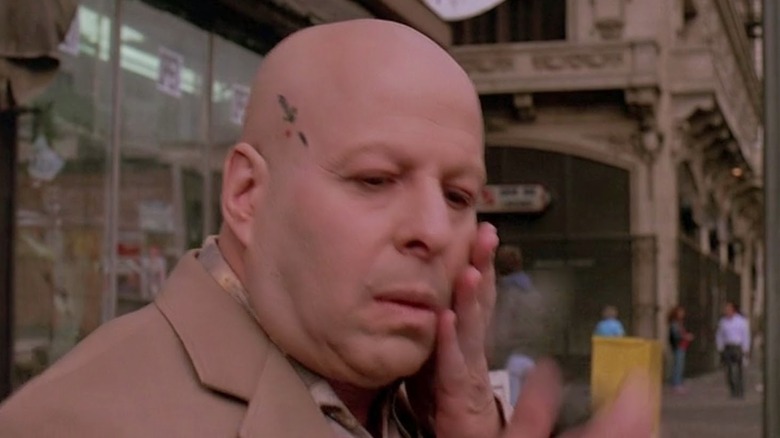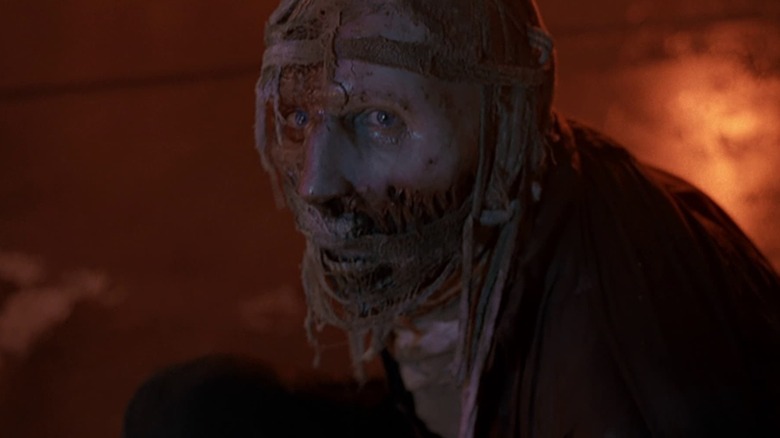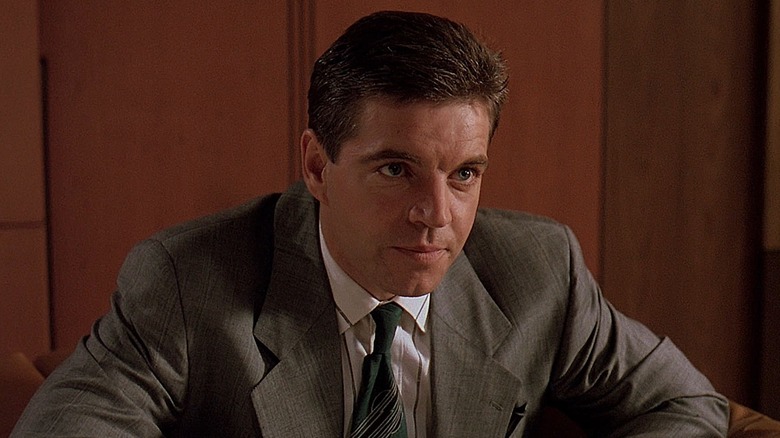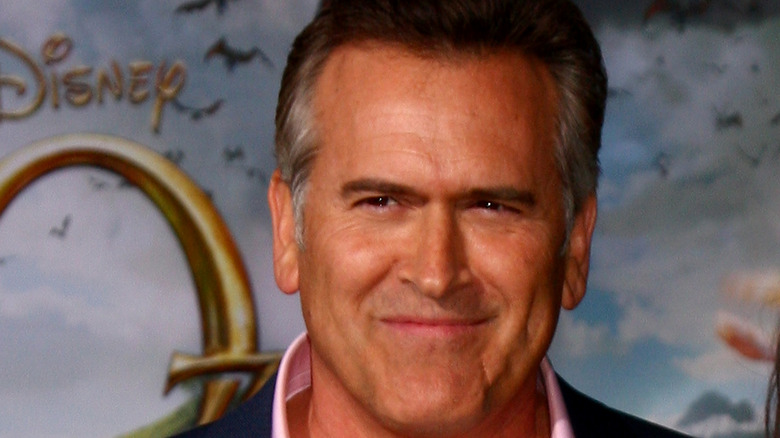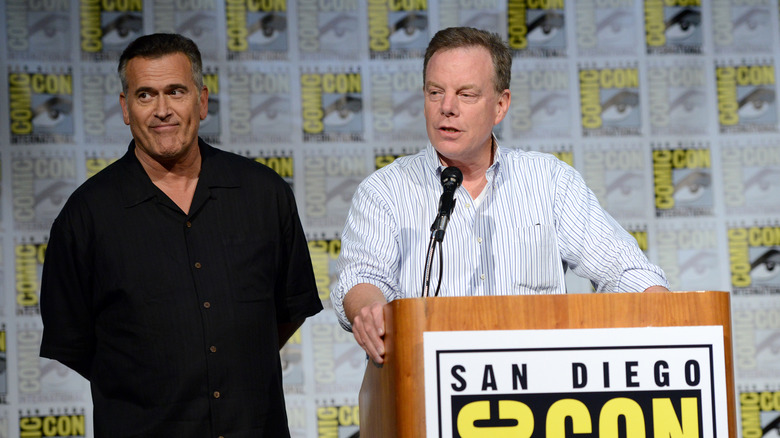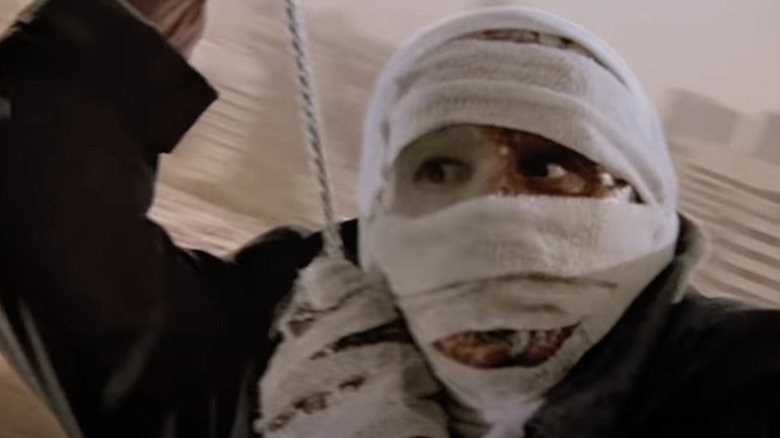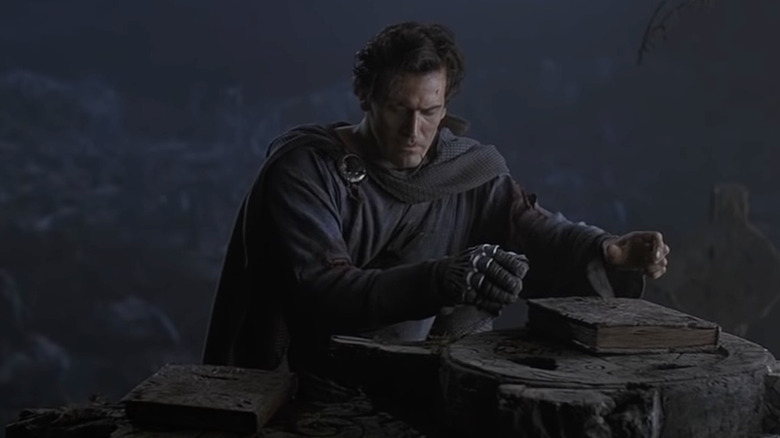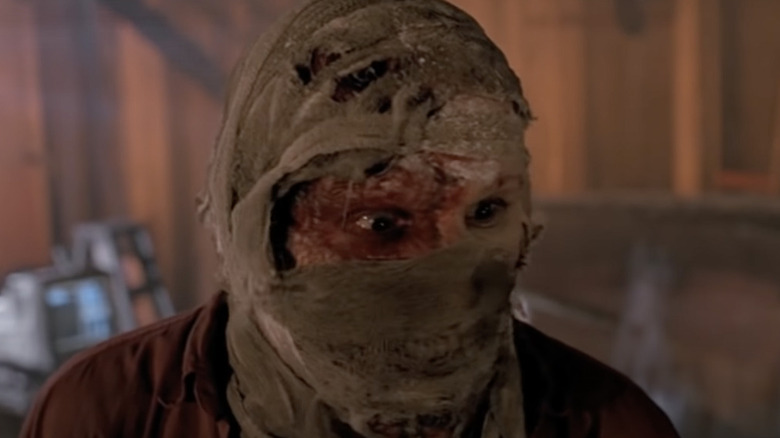The Untold Truth Of Sam Raimi's Darkman
Nowadays, Sam Raimi may be known best for films like "Doctor Strange in the Multiverse of Madness" or "Spider-Man," yet before the modern golden age of superhero movies was firmly established, the director introduced the world to his own, unique version of the genre with "Darkman." Released in 1990, "Darkman" was a victory for the young filmmaker, since it did well at the box office and built a devoted fanbase in the following years.
However, the entire experience was so rough for Raimi, that it still bothers him to this day. The project's cast and crew reunited in 2020 to reminisce and tell behind-the-scenes stories of "Darkman" to The Hollywood Reporter, but the director was noticeably absent. Producer Robert Tapert gave some clarification, noting that "it was such a conflicted time for Sam; I don't think he wants to revisit it."
Regardless of how Raimi feels about the path he took to make his creation, the fact that "Darkman" still stands out today is quite an impressive feat. Frances McDormand, who plays Julie in the film, puts it best: "What is gratifying is that it continues to intrigue an audience. Even with all the Marvel and DC Universe that we have now. 'Darkman' is an art film." "Darkman" is a fascinating film and perhaps not surprisingly, the history behind its creation is just as interesting. So, read on to discover the untold truth of Sam Raimi's "Darkman."
Sam Raimi created Darkman when he couldn't do Batman or The Shadow
Sam Raimi has wanted to make film adaptions of "The Shadow" and "Batman" for his entire career, and if given the chance, he would still love to take on those projects. In a recent interview with Empire, the director says, "I've always loved 'Batman.' If I ever saw the Batsignal up in the air, I'd come running." And with the same enthusiasm, he adds, "If I heard that deep, gurgling laugh of 'The Shadow' coming from the darkness, I would also tentatively step outside."
When talking with The Hollywood Reporter, Robert Tapert recalled Raimi's initial intentions before "Darkman" and says, "He tried very hard to make a movie about 'The Shadow,' but that proved impossible because at that time, it was going to be made by Bob Zemeckis." The director himself backed this up, though with slightly different reasoning. In Bruce Campbell's memoir, "If Chins Could Kill," Raimi said, "I really wanted to make 'The Shadow.' But Universal Studios wouldn't give me the rights to that. I met with them, but they didn't like my views at all, so I went, 'I'm just gonna write my own superhero.'"
Raimi had written a short story about a man who had lost his face and wore other people's faces instead, which he used as the basis of "Darkman." He developed that story into a film treatment, in which he added a mix of different aspects from other superheroes, most notably "The Shadow."
Bill Paxton could have been Darkman
Before the release of "Schindler's List" in 1993, Liam Neeson was not yet a major Hollywood star. So, he faced strong competition for the role of Peyton Westlake in "Darkman." In an interview with The Hollywood Reporter, casting director Nancy Nayor admitted this, but she also thought he was the best choice. She says, "Many were on the list for the lead, but Liam was so perfect, such a powerful presence with such emotional range and haunted eyes."
While other actors were considered for Peyton Westlake besides Liam Neeson, Bill Paxton has spoken publicly about his missed opportunity with "Darkman." In fact, we have Paxton to thank for Neeson auditioning at all. Paxton told The Onion about how he almost got the role of Peyton Westlake: "I came very close to being cast as Darkman. You know, you never talk about the movies you never got, but that was one I really wanted bad. I made the mistake of telling an actor friend of mine about the role: Liam Neeson. And he ended up getting the part! Goddamn that bastard! [Laughs.] I couldn't talk to him for six months; it just shattered me" (via The A.V. Club). Paxton would eventually go on to work with Raimi on "A Simple Plan," but it's hard not to wonder what his take on "Darkman" would have been.
Liam Neeson would have loved the movie as kid
Liam Neeson was well aware that "Darkman" could give him a great opportunity to advance his career. As he noted to The Hollywood Reporter, "it was a big fat juicy lead in a movie." But the prospect of playing the lead in a major Universal film was not the only reason that the actor wanted to be involved.
"Darkman" was made in an era long before the domination of the MCU, and over a decade before Sam Raimi's "Spider-Man." At the time, superhero movies were far less common than they are now. Although Tim Burton's "Batman" had come out just a year prior and was paving the way for dark superhero movies, "Darkman" was unique for incorporating aspects of comic horror into the mix. It was a blending of genres that Raimi had first perfected with his "Evil Dead" series (via Consequence). So, from the beginning, Neeson knew the end product would be special and a joy to watch, as he also said, "The script appealed to the little boy in me because I know it would have been something I would have loved to have seen on a Saturday matinee growing up in Ireland."
Sam Raimi helped Frances McDormand get an audition
Liam Neeson was not the only star of the film who faced significant competition before getting cast. Casting director Nancy Nayor tells The Hollywood Reporter, "For the female lead, we had narrowed down the choice between Fran McDormand and Kelly Lynch from 'Drugstore Cowboy.'"
For McDormand, however there was another factor that might have given her an edge over the others vying for the role. Not only was she living in the same three-bedroom house as Sam Raimi in Los Angeles, but she had actually found the place in Silverlake (via The A.V. Club). Sam and his brother, Ivan, were roommates with the Coen brothers, and McDormand was dating (and would later marry) Joel Coen. This Silverlake home was clearly overflowing with Hollywood talent, and would continue to do so, as other roommates included Holly Hunter and Kathy Bates, who lived there at various times.
McDormand was honest about her close relationship with Raimi and admitted to The Hollywood Reporter that "When the project came up, Sam was very influential in getting me an audition." Yet, she also attributed her success to the chemistry she and Neeson had while trying out for the parts. She added, "I think Liam had a lot to do with helping me get cast. We had a very good time together in the audition." In a 1990 interview with Fangoria, Raimi described McDormand as "a woman with a lot of soul," noting that he "counted on her to bring that soul to the picture, and she did, she really did." We can't help but agree with that.
Julia Roberts turned down Julie Hastings for personal reasons
While Frances McDormand and Kelly Lynch were both top choices for the role of Julie, there was another soon-to-be Hollywood superstar that was also high up on the list: Julia Roberts. Producer Robert Tapert tells The Hollywood Reporter that "the studio was pushing for Julia for a number of reasons." But in the end, the actress would choose to star in "Pretty Woman" instead.
Nancy Nayor explains why Roberts changed her mind about the project after auditioning: "[Roberts] and Liam had dated briefly and were broken up. When they read the audition scene together, both actors had tears in their eyes. It was so intimate. Right after, her agent called and said she felt it might be better if she was taken out of consideration. I think she felt it would just be too awkward for them to work together again so soon under the circumstances."
According to Marie Claire, Roberts and Neeson began their relationship in 1987 after working together on the film "Satisfaction." Roberts was only 19-years-old, while Neeson was 35 at the time. It's not known how long they dated, but they may have lived together in Venice, California for some time.
The script was rewritten multiple times
Even though "Darkman" was originally Sam Raimi's idea, the director worked with several others to write the script. Robert Tapert tells The Hollywood Reporter, "There are 5,000 names on that script. It was constantly being rewritten. In hindsight, I am not sure it ever got better; it just incorporated more people's pisses."
Raimi in particular turned to his brother, Ivan, as well as his friends and roommates, the Coen brothers, as the filmmakers often helped each other with their stories and projects (via The A.V. Club). Tapert confirmed this: "The Coen brothers were not credited by the guild, but they were instrumental early on with building the structure. The idea sprung from Sam's head, and Joel and Ethan coaxed him along that road. Chuck Pfarrer was the best at the villains."
"Darkman" officially credits five screenwriters — the Raimi brothers, Pfarrer, and Joshua and Daniel Goldin — and Tapert's comments about the Coen brothers brings it to an unofficial seven writers. However, it's possible that there were even more people, who contributed as well to the numerous drafts that were written, as Raimi attempted to hammer out the story.
Universal horror films of the 1930s were a major inspiration
"Darkman" is a much darker type of movie than the average superhero flick, especially for the time it was released. From the ghastly wounds and deformities Peyton Westlake receives that transform him into Darkman, to the very disturbing practice of the main villain, Robert G. Durant, of savagely seizing fingers for his own personal collection, the film blends various elements of the horror genre into its superhero tale.
But it wasn't just the storyline that incorporated aspects of horror movies. Several of the sets used in the film were also constructed as an homage to the old-school monster classics. Production designer Randy Ser tells The Hollywood Reporter, "As the film was a Universal picture, the designs were inspired by and meant to be a subtle homage to the studio's 1930s horror films. Darkman first arriving at his lair warehouse was one where the design was especially influenced by Universal horror films of the 1930s. The design suggested the play of light and shadow between life and death of Dr. Frankenstein's laboratory."
Composer Danny Elfman was asked to do more than make music
Composer Danny Elfman has now worked with Sam Raimi on many of his films, including "Spider-Man," "Army of Darkness," and "Oz the Great and Powerful." But this perfect partnership actually started with "Darkman." At that point, Elfman was ready and eager to take on any project with the director after seeing "Evil Dead" for the first time. So, when the composer got the call that Raimi wanted to meet on the set of "Darkman," he said "yes" right away.
Elfman describes this humorous first meeting to The Hollywood Reporter: "It's a night set at Universal with water cranes for rain. He introduces himself really quickly, says he loves my work and then says, 'Let's put this guy to work!' They put me in a raincoat, give me a bucket and tell me that when Liam comes stumbling out, you throw the water in his face for when a car passes by and splashes him. I cursed him later because I got a cold." While Elfman's initial work on "Darkman" wasn't exactly what he expected, he was eventually able to sit down and actually score the film to create music that was "sad and romantic." It sounds like Elfman wasn't too upset about this first meeting on "Darkman," as he later told Den of Geek that Raimi is "fun and easygoing" to work with.
Colin Friels was injured in a fight scene
Scottish-Australian actor Colin Friels makes his mark in "Darkman" as the evil mastermind Louis Strack Jr. and unfortunately, both Friels and his on-screen counterpart met some bad luck in the world of "Darkman."
Cinematographer Bill Pope tells The Hollywood Reporter the frightening, yet incredible story of the actor's resilience during an accident on set. He notes, "We built a three-story steel girder set in an airplane hangar. In days of very little safety supervision, we all walked the steel like real steelworkers, acting and shooting high in the air. No safety harnesses. At some point, Colin Friels fell off in the middle of a fight scene and broke his femur. He went to the hospital, got it set, got some painkillers and returned that afternoon to finish the scene." Particularly in the early days of his career, Raimi was known for his hands-on, resourceful approach of doing a lot with a little, and clearly this attitude of "getting things done" was shared by the rest of the crew even in this bigger-budget production (via No Film School). Regardless, we're glad that Friels was okay, and that Hollywood has gotten a bit more savvy to proper safety supervision on set.
Bruce Campbell helped Sam Raimi with sound effects
Sam Raimi and Bruce Campbell have been friends since high school (although they've known each other since childhood), so perhaps it's no surprise that Raimi cast Campbell as the hero Ash Williams in the "Evil Dead" franchise (via IGN). In fact, the two have such a strong friendship that Campbell often makes cameos in Raimi's films. So, of course Campbell made an iconic cameo in "Darkman" and also contributed his talent to the behind-the-scenes studio work.
When recalling his involvement with "Darkman" to The Hollywood Reporter, Campbell says, "We both loved sound. It needed lots of looping, lots of sound effects. So I made studio guy money and wound up voicing every criminal who fell to their death. Holy shit, I screamed my brains out. And they're good, vintage screams. We got to a point where we were mixing and Sam goes, 'S***, I need Darkman to yell 'Julie!' And he looks at me and says, 'Get in the booth.' So that's in there. And I did all the television looping for Liam."
The film was completely re-edited in secret one final time
Perhaps the most shocking revelation from The Hollywood Reporter oral history of "Darkman" is the film's frantic re-editing that was done at the very last minute. "Darkman" struggled to land with preview audiences, perhaps in part because Universal wanted to use their own editor and exclude Raimi from the editing process, which gave the film a less coherent vision.
Robert Tapert says, "I don't mind saying this now, and Sam will probably be unhappy, but the studio said, 'There is nothing we can do to save this picture. Let's lock it.' So we locked the picture on Friday night at 5 p.m. We were incredibly disheartened and dispirited. And Sam's present editor, a guy by the name of Bob Murawski, said, 'There is a much better movie than what we are locking right now.' So, the decision was made that we would re-edit the movie. We spent 48 hours basically recutting the entire movie, restoring things we thought were important. We added nine minutes back in, things we really liked that the preview audiences would recoil from, but that was what it was meant to do. We locked it — and didn't tell anybody."
The studio was furious over the deception, especially Universal Pictures chairman Tom Pollack. However, it was too late to change the film back, so two days later the critics watched the edit that Universal had not approved. Tapert notes that Sam Raimi probably would not have done the same thing if he had known about the secret edit, but Tapert believed he was saving the film. And it was likely for the best that he did because "Darkman" ended up at #1 for the movie's opening weekend.
The filmmakers were impressed with the marketing
Along with the improved, last-minute cut of the movie, the filmmakers attributed much of the box office success to the film's brilliant advertising, which some argue was an early example of viral marketing (via HeadStuff). There were billboards and posters put up around various cities, all posing the mysterious question "Who is Darkman?" In an interview with The Hollywood Reporter, former Universal production president Sean Daniel flat out states that "It would not have opened at No. 1 without 'Who is Darkman?'" Robert Tapert agrees, saying, "The marketing team liked the movie because they had a handle on it. 'Who is Darkman?' That was a stroke of genius."
The former Universal head of creative advertising, David Sameth, definitely understood the assignment when he was given the task of creating the film's advertising. He says, "The question was simple, memorable, had the title of the movie in it and super cheap to print on posters and stick those all over fences in major cities." Whether it was simply the effective tagline or not, the movie did much better than everyone involved thought it would and managed to earn $48.8 million worldwide.
Darkman and Ash Williams teamed up
After "Darkman" was released, Marvel decided to adapt it into two limited comic book series: The first came out in 1990, which was followed by a sequel series in 1993 (via Comic Vine). Then in 2006, Dynamite Entertainment produced a more epic storyline for the character, as Darkman teamed up with the legendary slayer of the undead, Ash Williams, to save humanity from the Deadite forces in the crossover series "Darkman Vs. Army of Darkness."
Darkman and Ash's showdown with the "Evil Dead" begins after the events of the direct-to-video "Darkman III: Die Darkman Die" (which Raimi did not direct). In the comic, Darkman's old flame Julie Hastings becomes possessed and turned into a Deadite. Darkman uses the Necronomicon to cast a spell and save Julie, which summons Ash to emerge from a portal, ready to fight the undead army once more.
There may be a Darkman legacy sequel
Even though the opening weekend box office results exceeded the filmmakers' expectations, "Darkman" did not do well enough for Universal to decide it was worthy of a proper franchise. Instead, the film got lower budget, direct-to-video sequels that Raimi didn't direct, and which replaced Neeson with Arnold Vosloo. But with the cult following "Darkman" has amassed over the years and the current popularity of legacy sequels, there is a possibility the studio might return to the IP. And when asked that very question by The Wrap, Sam Raimi revealed it was true that the wheels had been set in motion. He says, "Yes. Universal is talking about a 'Darkman' sequel. There's a producer attached. I haven't heard the story yet or gone into it, I've been so busy with ["Doctor Strange in the Multiverse of Madness"]. But I think it's cool."
If Raimi is attached to the new project, the question remains if Liam Neeson will also be involved. The director would very much like the actor to come back, as he adds, "I don't know if he'd do it, but he'd be incredible." Neeson reprising the role of Peyton Westlake is not beyond the realm of possibility. In an interview with Comicbook.com, the actor was asked if he would do a legacy sequel of "Darkman" and he says, "That's a good question. I would be very interested in reading the script. Very."
